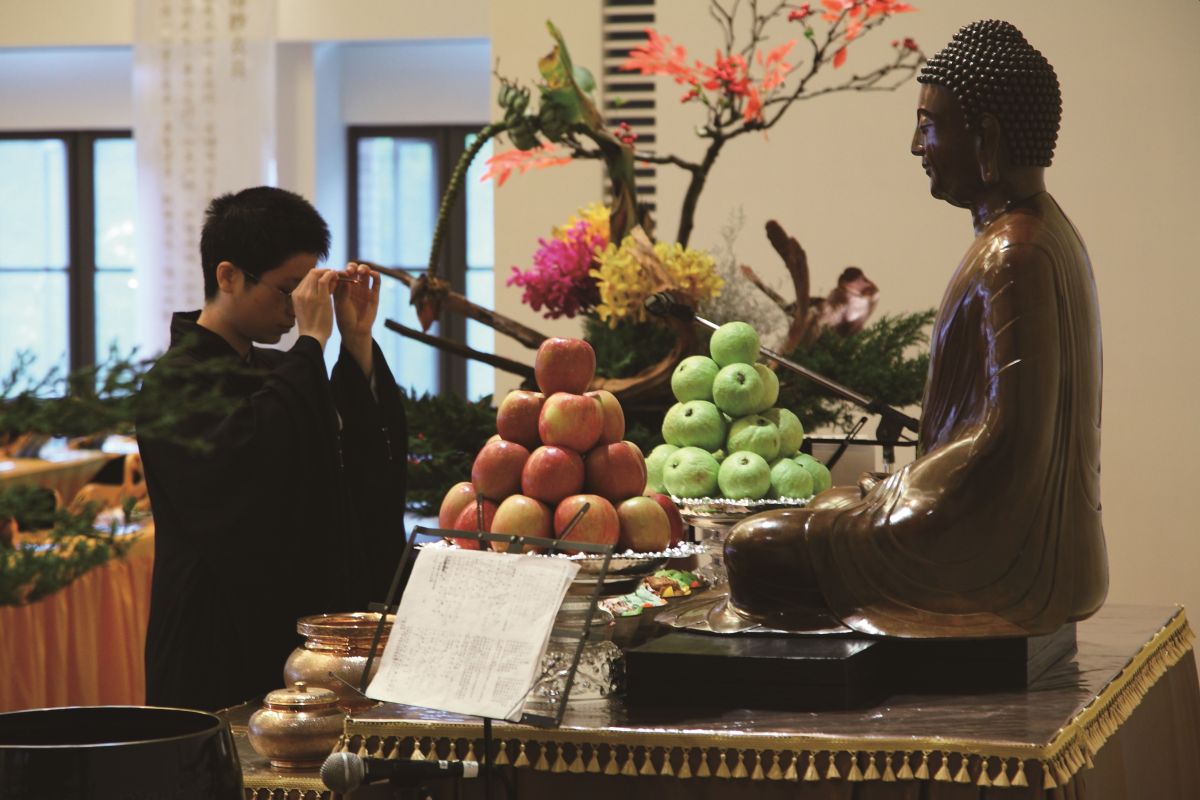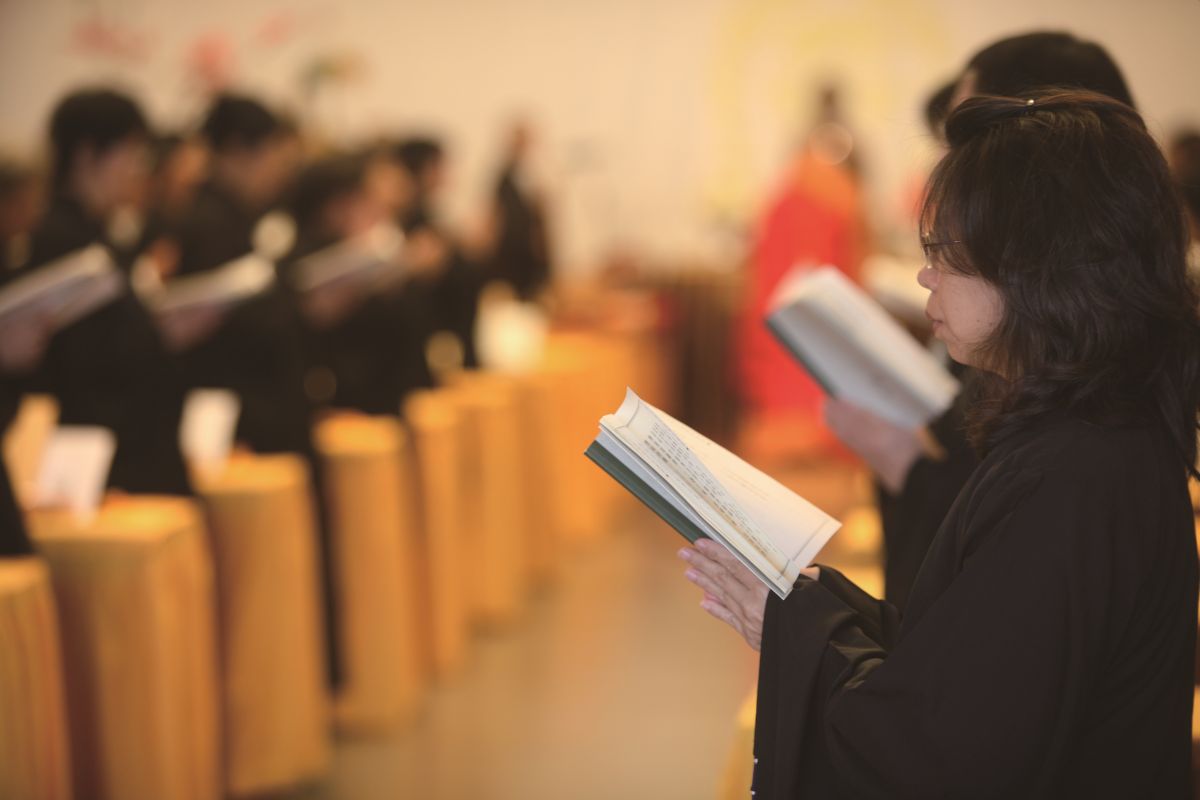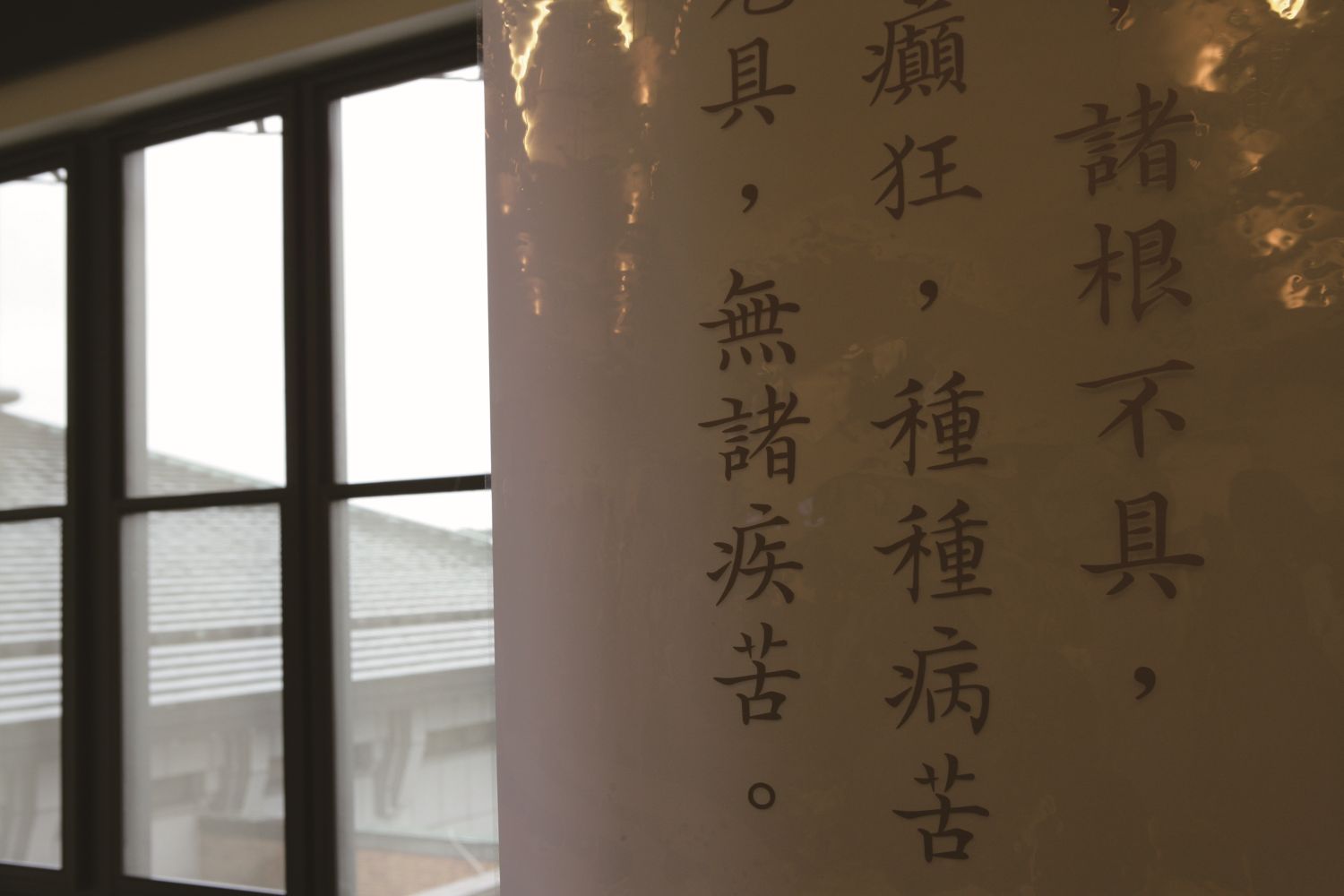Special Topics
How to Practice the Medicine Buddha’s Dharma Method
 The Medicine Buddha, acclaimed as the "Great Medicine King Buddha", administers medicine according to sentient beings' ailments. Not only does he treat sentient beings' physical illnesses, but also alleviates their vexations and troubled thoughts. So how should we practice and benefit from such limitless Dharma treasures so as to harmonize with the Buddha's original vows, as well as take the prescribed medication to develop compassion and wisdom?
The Medicine Buddha, acclaimed as the "Great Medicine King Buddha", administers medicine according to sentient beings' ailments. Not only does he treat sentient beings' physical illnesses, but also alleviates their vexations and troubled thoughts. So how should we practice and benefit from such limitless Dharma treasures so as to harmonize with the Buddha's original vows, as well as take the prescribed medication to develop compassion and wisdom?Whenever friends and family are sick or their bodies and minds are not in harmony, many Buddhists immediately persuade them to join a group practice of the Medicine Master Sutra to pray for Medicine Buddha's blessings. They do so in the hopes of eliminating disasters, prolonging life, being free from adversities, and attaining good fortune. Furthermore, in times of great calamities such as floods, wars etc., eminent monks and practitioners of great virtue will also conduct the Medicine Master Dharma Assemblies to pray for a world full of peace and free from disasters. For example, in the early turbulent years of the Republic of China, Venerable Tai Xu and Venerable Yin Shun had both understood the situation and vigorously propagated the Medicine Buddha's Dharma method to the people.
Skillful Means of the Medicine Buddha
Whether they are mild individual diseases or disasters on a national scale, the Medicine Buddha is able to prescribe appropriate treatments, eradicate sufferings, and fulfill people's wishes. So, exactly how remarkable and ingenious is the Medicine Buddha's Dharma method? Furthermore, how do we utilize it in our practice in order to actually pacify our body and mind, thereby uniting with the Medicine Buddha's aspirations? In accordance with the skilful means mentioned in the sutra that the Medicine Buddha uses to help relieve the sufferings of sentient beings, Venerable Master Yin Shun summarized them as three Dharma methods: namely, recollect the Buddha while chanting his name, recite the mantra to cure diseases, and make offerings to the Buddha.
 1. Reciting the Buddha's Name to Discover the Inherent Buddha Nature
1. Reciting the Buddha's Name to Discover the Inherent Buddha NatureReciting the Buddha's name is the easiest and most convenient method of practice. Repeatedly mentioned in the Medicine-Master Sutra, the method of Buddha-name recitation is also the most meritorious and beneficial of all Dharma methods. Hearing and reciting the Buddha's name not only can free us from all sufferings and vexations, but also keeps us away from the four unwholesome states of greed, jealous slander, disparagement of right views and conceit in one's own Dharma knowledge, and malediction and legal disputes. Doing so also helps us attain four kinds of benefits: rebirth in the Pure Land, rebirth in heavenly realm without falling back into the other paths of existence, rebirth as humans, and having a male rebirth.
Why is merely hearing and reciting the Buddha's name so beneficial? In his book "Commentary on the Medicine-Master Sutra", Master Yin Shun explained that listening to the Buddha's name is also known as "practice of listening to doctrine (śrutavāsanā, in Sanskrit)". For every time we hear and recite the Buddha's name, we are planting a seed of virtuous thoughts in our mind. In times of disaster or when impeded by vexations, these thoughts will naturally sprout up to remind us of the Medicine Buddha's compassion and luminosity. However, the Buddha’s name is not a panacea. Although hearing and reciting the Buddha's name can provide us with blessings from the Medicine Buddha, distance us from unwholesome states, and help us keep our precepts intact, its fundamental function is to remind us, through the Buddha's name, to transform our thoughts, and give rise to shame, repentance and gratitude. Doing so would help us break free and move on from vexations such as greed, arrogance, jealousy, hatred etc.
2. Embodying the Medicine Buddha's Original Vows through Reciting the Medicine-Master Mantra
According to narratives in the Medicine-Master Sutra, the Medicine-Master Mantra was spoken by the Medicine Buddha when he entered a samadhi called "Eliminating All the Suffering and Afflictions of Sentient Beings" in the attempt to free all sentient beings from physical and mental sufferings. Therefore, the Sutra specifically emphasizes the benefits of reciting mantras to cure ailments.
The Sutra mentions that we can sincerely recite the Mantra of the Medicine Buddha 108 times in front of the sick patient's meals, medication or drinking water and let the patient consume them afterwards, so that they can receive the blessings of the Medicine Buddha conferred upon these items through the Mantra of the Medicine Buddha. Doing so would help relieve their suffering and pacify their minds. Healing through mantra recitation is most effective when practiced by the patients themselves, unless their condition is so severely incapacitating. In this case, the patients' friends or family may recite the mantra on their behalf.
Venerable Hui Min, President of the Dharma Drum Buddhist College, pointed out that although Buddhism refutes superstitious spell casting, it does not deny the blessing functions of mantra chanting. Particularly when performed with a concentrated mind, mantra recitation can naturally resonate and merge with the powers of the Medicine Buddha's compassionate vows. When chanting this mantra, we can either sit down or walk in meditation. If our time is constrained, we can also focus on reciting only the very center of the mantra. However, sincerity, concentration and diligence are most crucial in our practice of mantra recitation. In this respect, it is similar to chanting the Buddha's name.
 3. Making offerings and upholding the Dharma helps nurture our Dharma body (dharmakāya) and wisdom life
3. Making offerings and upholding the Dharma helps nurture our Dharma body (dharmakāya) and wisdom lifeThe practice of making offerings has multiple benefits including: enjoying the protection and safeguarding of the Buddhas; being freed of all manner of hardship, fear, and national disorders; and being blessed with four kinds of karmic reward--namely, longevity, prosperity, a dignified social status, and offspring. But, as Ven. Yin Shun reminded us, the point of making universal offerings is to develop our devotional and respectful mind towards the Buddha, Dharma, and Sangha. Thus, we aspire to hear, study, and practice the doctrinal teachings in order to further contemplate and realize the Dharma.
Therefore, instead of merely enshrining a Buddha statue or a copy of the Medicine Buddha Sutra in our home altar, a more meaningful act is to delve into the Buddha’s fundamental vows, and digest the meaning of the doctrine. In particular, the Sutra urges people to engage in practice themselves, transcribe its text, and explain its ideas to others. Displaying a spirit that is beneficial for both self and others, the practice method not only enables people upholding the Sutra to dissolve misfortune and enjoy longevity, but also nurtures their Dharma-body and wisdom life.
A prescription for treating symptoms and addressing root causes
The Medicine Buddha Sutra offers three methods of practice, each of great benefit. These methods cover everything ranging from health, well-being, and prosperity in one’s present world, to the guarantee of not falling into evil rebirths, gaining a heavenly rebirth, and, eventually, attaining Buddhahood in the future. This is to “first invite people according to what they desire, and later inspire them toward wisdom in accord with the Buddha,” said Ven. Guo Xu, director of DDM Anhe Branch Monastery, who has had long experience in guiding group practice dedicated to the Sutra. On the surface, the Medicine Buddha seems to be satisfying people’s secular needs only; yet, at a deeper level, it is designed in such a way that people can focus on Dharma practice without having to worry about their daily life. This represents the Medicine Buddha’s expedient skillful means.
Whether our practice is reciting the Buddha’s name, chanting the dharani, or making offerings, its purpose is for us to understand that the Medicine Buddha’s great vows and expedient means are intended to relieve practitioners of their mundane burdens. This inspires us to not only pray to the Medicine Buddha for help and empowerment, but also learn how to perfect our bodhisattva practice for the benefit of self and others. This is the essential point of upholding the Medicine Buddha Sutra.
The Medicine Buddha Dharani liberates beings from distress and misfortune
The fundamental dharani of the Medicine Buddha is also the Bhaisajyaguru Empowerment Dharani included in the Ten Short Mantras, often performed in Buddhist daily morning and evening practice sessions. According to textual research by Lin Guangming, Director of the Center for Buddhist Studies of Fo Guang University, the Medicine Buddha Sutra as translated by Master Xuanzang in the Tang dynasty didn’t actually include any dharani. The dharani in the currently popular edition is most likely part of a later added paragraph based on Master Yi Jing’s translated version, about the origin of the dharani, the dharani itself, methods of upholding it, and its beneficial effects.
The Dharani in Chinese pronunciation and its meaningare as follows:
| The Original Text in Chinese pronunciation | Nāmō | bóqiéfádì | bīshāshèjùlū | pīliūlī | bōlāpó | hélàshěyě | dá tuō jiē duō yě | āluōhēdì |
sānmiāosānbótuóyě |
| Translation | Homage to | The world- honored one |
Healing Buddha | Lapis Lazuli | Light | King | Tathāgata | Worthy of offerings | Perfectly enlightened |
| The Original Text | Dānzhītuō | ōng | pīshāshì | pīshāshì | pīshā shè | sānmōjiē dì | suōhē |
| Translation | The Medicine Buddha Mantra is intoned as: |
Oṃ | Healing | Healing | Effective healing | Universal salvation | Quickly attained |
The first half is about taking refuge in the Medicine Buddha (Bhaiṣajya-guru-vaiḍūrya-prabhā-rājāyaTathāgata), and praying for his spiritual empowerment. The second half, which begins with “The Medicine Buddha Dharani is intoned as” and marks the very center of the dharani, is for relieving beings from sickness and distress through instant healing.
Extended Reading:
Major Theme: Attaining Peace and Ease in the Present Life
Medicine Buddha's Twelve Great Vows As an Example of Buddhism Practice
How to Practice the Medicine Buddha's Dharma Method
Resource: Issue 331 of Life Magazine, Dharma Drum Publishing Corporation
Photos: Issue 331 of Life Magazine, Dharma Drum Publishing Corporation
Translation: Vicky Wei (韋徵儀), Dharma Drum Mountain Translation Team
Editing: Cheng-yu Chang (張振郁), Chia-chen Chang (張家誠), Keith Brown
